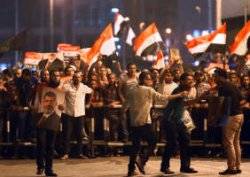Egyptian security forces fired tear gas in central Cairo after scuffles broke out between supporters of the deposed Islamist president Mohamed Morsi and locals, eye witnesses said.
Ambulance authorities and officials said at least 24 people had been injured in the clashes, which were also between police and protesters, on Monday.
The clashes marked the first violent confrontation involving pro-Morsi protesters for a week.
Last Monday, 53 pro-Morsi demonstrators were killed outside the Republican Guard compound in Cairo. Four soldiers also died in the clash.
Earlier on Monday, US Deputy Secretary of State William Burns made the first senior level visit to Egypt since Morsi was overthrown by the military on July 3 following days of mass protests.
Burns held talks with Egypt's interim leaders and the head of the military.
Washington has been sharply criticized by both Morsi's supporters and opponents for what each side perceives as support for their rival's position.
"Only Egyptians can determine their future. I did not come with American solutions, nor did I come to lecture anyone. We know that Egyptians must forge their own path to democracy. We know that this will not mirror our own and we will not try to impose our model on Egypt," Burns said.
However, Burns added that the US would "stand behind certain basic principles, not any particular personalities or parties."
He said that the US backs those siding with the aspirations of Egyptians who went out during the 2011 uprising against longtime autocratic leader Hosni Mubarak.
Maximum restraint
Burns said that despite concerns about developments of the last two weeks, the US believed that the ongoing transition was an opportunity, following the 2011 revolution, to create a democratic state that "protects human rights and the rule of law and that enables the economic prosperity of its citizens".
"We support the adoption of reforms that can lead to an early IMF agreement while sustaining funding for social safety net programmes," he said.
The US deputy secretary went on to condemn violence at demonstrations in the Sinai and sectarian violence, calling on maximum restraint by security forces.
Burns was speaking after holding talks with army chief Abdel Fattah al-Sisi, military-appointed president Adly Mansour and caretaker prime minister Hazem al-Beblawi.
Tamarod, the movement that spearheaded the grassroots campaign against Morsi, said it rejected an invitation to meet the US envoy on Monday, citing Washington's "interference" in Egypt and its failure to support their cause from the outset.
"We rejected the invitation... because the United States did not stand with the Egyptian people from the beginning," Islam Hammam, one of the group's organizers, told AFP news agency.
Burns maintained previous US statements and refrained from saying Morsi was the victim of a coup. If the US terms the deposing of Morsi a coup, it would legally be required to freeze some $1.5bn in US military and economic assistance to Cairo.
On Sunday, two influential US Republican senators, Lindsey Graham and John McCain, urged the administration to cut American aid to Egypt in response to the army's ouster of Morsi.
Demonstrations continue
By evening, thousands of pro-Morsi protesters staged a sit in at Cairo's Rabaa al-Adawiya mosque, where many have been rallying for the past two weeks.
Police fired tear gas at the protesters on and around Ramses Square, who retaliated by throwing rocks back at them.
After a week of relative calm, scenes of running street battles close to the Egyptian Museum, one of the country's main tourist attractions ignited further concerns about stability.
"I've had enough of this chaos," said Ashraf Mohamed, who watched the clashes from a distance.
Young men, their mouths covered to protect them from tear gas, threw stones at police and shouted pro-Mursi and anti military slogans, as well as "Allahu Akbar!" (God is greatest).
Military helicopters hovered overhead and police vans were brought in to quell the trouble, but when that didn't work, dozens of riot police moved in. Medics treated men with deep gashes to their eyes and faces nearby.
During his single year of turbulent rule, Morsi was accused of concentrating power in Brotherhood hands, sending the economy into freefall and failing to protect minorities.
But his supporters say his overthrow was an affront to democracy.
PHOTO CAPTION
Egyptian supporters of the Muslim Brotherhood and of Egypt's ousted President Mohamed Morsi block on July 16, 2013 the Six October Bridge in the center of Cairo.
Aljazeera


 Home
Home Discover Islam
Discover Islam Quran Recitations
Quran Recitations Lectures
Lectures
 Fatwa
Fatwa Articles
Articles Fiqh
Fiqh E-Books
E-Books Boys & Girls
Boys & Girls  Hajj Rulings
Hajj Rulings Hajj Fatwas
Hajj Fatwas














